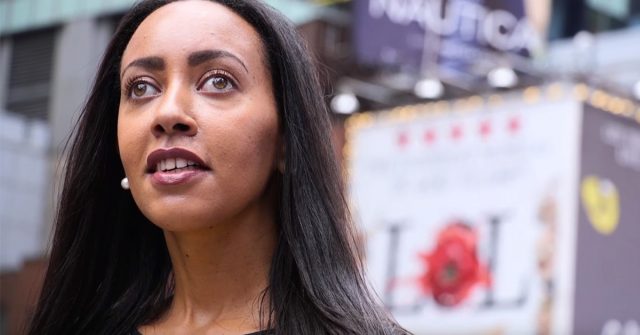Haben Girma is a lawyer, a hats lover, a ballroom dancer, a 2013 White House Champions of Change honoree, an advocate for the rights of people with disabilities, and now she is an author of her memoir. And she does that as a Deafblind individual.
She is a child of Eritrean and Ethiopian immigrants. She learned sign language in a public school in Oakland California. She communicates using a system in which a typist types the spoken conversation using a keyboard that is connected to a real-time Braille reader via Bluetooth so that she can communicate in real-time. She can participate in the conversation using spoken English.
This form of communication combined with a service dog has helped her to become the first Deafblind Harvard graduate from Harvard Law School in 2013. Since then, she has been working as a disability rights lawyer. Now, she is a writer of her memoir.
Who is Haben Girma?
1. SHE IS A CHILD OF IMMIGRANTS
Her mother left Eritrea in 1983 during the independence war with Ethiopia. She was “walking at night to try to avoid the different military groups fighting in that area.” She settled in California where she met Haben’s father, an Ethiopian immigrant. Haben was born in 1988. “My parents tried very hard to make sure I had access to everything, and consequently I grew up thinking I could have access to everything,” she told the Harvard Law Bulletin.
2. SHE WAS A SELF-ADVOCATE AT COLLEGE
When she started college at Lewis & Clark College in Oregon, she had difficulties in the cafeteria. The menus were on the wall and so she was not able to order. Instead, she got whatever she was served. She thought she deserved to have a proper meal, and therefore she asked the manager to have the cafeteria menu sent to her electronically so that she could have it translated to Braille. The manager at first said that he was too busy to do that, but then she explained to him that if he refuses to do it, she would sue him. After that, she received the menu in her inbox regularly.
3. SHE IS A HARVARD LAW SCHOOL GRADUATE
Girma was certain that she wanted to work as a legal advocate for people with disabilities even before she was accepted at Harvard. She got all her assigned readings and material in a digital form and read them on a Braille display. During classes, she had a voice transliterator in the back of the room who narrated everything to her transmitting his words through a microphone and into her earphones.
4. SHE IS A CHAMPION OF CHANGE
In 2013, President Obama invited her to the White House to introduce him to an event celebrating the anniversary of the Americans with Disabilities Acts. He typed his side of the conversation into the keyboard and the interaction was very positive. “A lot of people are uncomfortable with something that’s different…they come up with all kinds of excuses that basically say, ‘this is weird; I don’t want to get involved.'” But Obama wasn’t. “He graciously switched from speaking to typing so that I could access his words. And we had an awesome conversation.”
5. SHE IS A PROFESSIONAL ADVOCATE FOR THE RIGHTS OF PEOPLE WITH DISABILITIES
After she finished law school, she started working for Disability Rights Advocates, a non-profit in Berkeley, CA. According to her official bio on the organization’s website, “Working to increase access to technology for people with disabilities, she helped achieve victory in National Federation of the Blind v. Scribd, one of only two decisions to hold that the ADA applies to virtual businesses.”
6. SHE IS A WRITER OF HER MEMOIR
In her new book, Haben: The Deafblind Woman Who Conquered Harvard Law she is telling the story of her life. She hopes she inspires people to gain a new perspective on disabled people and treat them better.
“I hope people can move away from seeing people with disabilities as incompetent. If we remove barriers, we can have great inclusion.”





